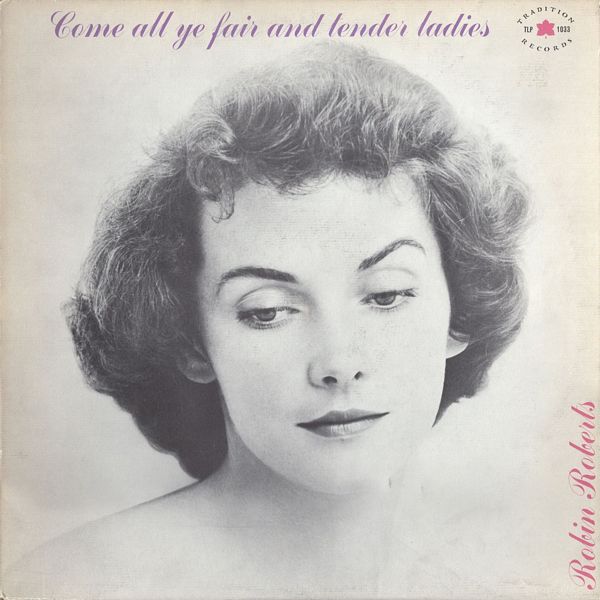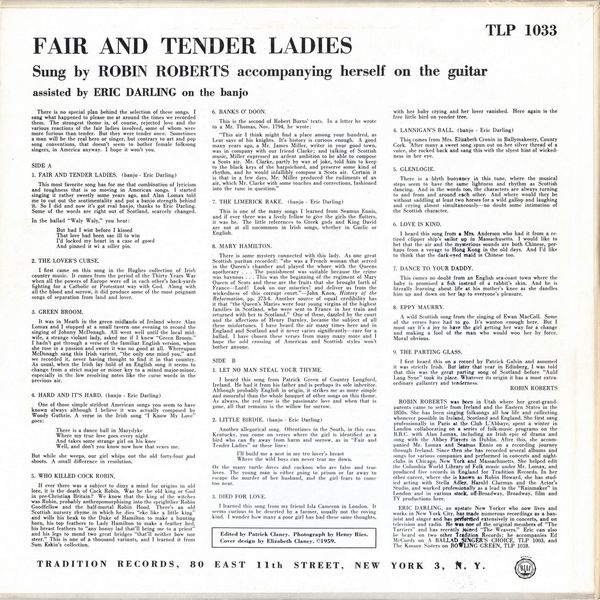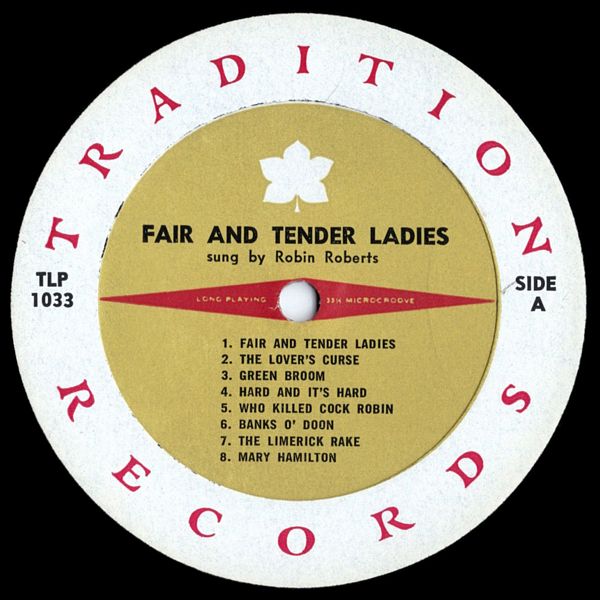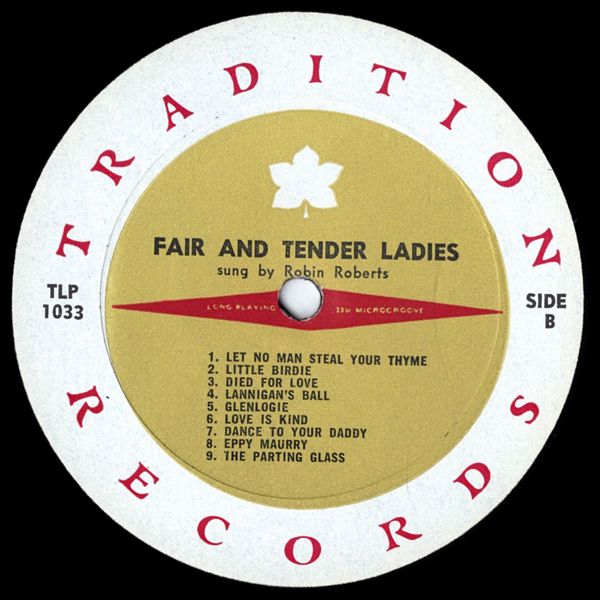

 |



|
Sleeve Notes
There is no special plan behind the selection of these songs. I sang what happened to please me at around the times we recorded them. The strongest theme is, of course, rejected love and the various reactions of the fair ladies involved, some of whom were more furious than tender. But they were tender once. Sometimes a man will be the real hero or singer, but contrary to art and pop song conventions, that doesn't seem to bother female folksong singers, in America anyway. I hope it won't you.
FAIR AND TENDER LADIES (banjo – Eric Darling)
This most favorite song has for me that combination of lyricism and toughness that is so moving in American songs. I started singing it rather sweetly some years ago, and Alan Lomax told me to cut out the sentimentality and put a banjo strength behind it. So I did and now it's got real banjo, thanks to Eric Darling. Some of the words are right out of Scotland, scarcely changed.
In the ballad "Waly Waly," you hear:
But had I wist before I kissed
That love had been sae ill to win
I'd locked my heart in a case of gowd
And pinned it wi a siller pin.
THE LOVER'S CURSE
I first came on this song in the Hughes collection of Irish country music. It comes from the period of the Thirty Years War when all the powers of Europe were off in each other's back-yards fighting for a Catholic or Protestant way with God. Along with all the blood and sorrow, it did produce some of the most poignant songs of separation from land and lover.
GREEN BROOM
It was in Meath in the green midlands of Ireland where Alan Lomax and I stopped at a small tavern one evening to record the singing of Johnny McDonagh. All went well until the local midwife, a strange violant lady, asked me if I knew "Green Broom." I hadn't got through a verse of the familiar English version, when she rose in a passion and swore it was no good at all. Whereupon McDonagh sang this Irish varient, "the only one mind you," and we recorded it, never having thought to find it in that country. As usual, when the Irish lay hold of an English song it seems to change from a strict major or minor key to a mixed major-minor, especially in the low resolving notes like the curse words in the previous air.
HARD AND IT'S HARD (banjo – Eric Darling)
One of those simple strident American songs you seem to have always known although I believe it was actually composed by Woody Guthrie. A verse in the Irish song "I Know My Love" goes:
There is a dance hall in Marydyke
Where my true love goes every night
And takes some strange girl on his knee
Well, and don't you know now how that vexes me.
But while she weeps, our girl whips out the old forty-four and shoots. A small difference in resolution.
WHO KILLED COCK ROBIN
If ever there was a subject to dizzy a mind for origins in old lore, it is the death of Cock Robin. Was he the old king or God in pre-Christian Britain? We know that the king of the witches was Robin, probably anthropomorphising into the sprightlier Robin Goodfellow and the half-mortal Robin Hood. There's an old Scottish nursery rhyme in which he dies "eke like a little king" and wills his beak to the Duke of Hamilton to make a hunting horn, his top feathers to Lady Hamilton to make a feather bed, his breast feathers to "any bonny lad that'll bring me to a priest" and his legs to mend two great bridges "that'll neither bow nor steer." This is one of a thousand variants, and I learned it from Sam Eskin's collection.
BANKS O' DOON
This is the second of Robert Burns' texts. in a letter he wrote to a Mr. Thomas, Nov. 1794, he wrote:
"This air I think might find a place among your hundred, as Lear says of his knights. It's history is curious enough. A good many years ago, a Mr. James Miller, writer in your good town, was in company with our friend Clarke; and talking of Scottish music, Miller expressed an ardent ambition to be able to compose a Scots air. Mr. Clarke, partly by way of joke, told him to keep to the black keys of the harpsichord, and preserve some kind of rhythm, and he would infallibly compose a Scots air. Certain it is that in a few days, Mr. Miller produced the rudiments of an air, which Mr. Clarke with some touches and corrections, fashioned into the tune in question."
THE LIMERICK RAKE (banjo – Eric Darling)
This is one of the many songs I learned from Seamus Ennis, and if ever there was a lively fellow to give the girls the flutters, it was he. The little references to Greek gods and King David are not at all uncommon in Irish songs, whether in Gaelic or English.
MARY HAMILTON
There is some mystery connected with this lady. As one great Scottish puritan recorded: "she was a French woman that served in the Queen's chamber and played the whore with the Queens apothecary . . . The punishment was suitable because the crime was haynous . . . This was the beginning of the regiment of Mary Queen of Scots and these are the fruits that she brought forth of France — Lord! Look on our miseries! and deliver us from the wickedness of this corrupt court." — John Knox, History of the Reformation, pp. 373-4. Another source of equal credibility has it that "the Queens Manes were four young virgins of the highest families in Scotland, who were sent to France in her train and returned with her to Scotland." One of these, dazzled by the court and the affections of Henry Darnley, became the subject of all these misfortunes. I have heard the air many times here and in England and Scotland and it never varies significantly — rare for a ballad. I have chosen these verses from many many more and I hope the odd crossing of American and Scottish styles won't bother anyone.
LET NO MAN STEAL YOUR THYME
I heard this song from Patrick Green of Country Longford, Ireland. He had it from his father and is perhaps its sole inheritor. Although probably English in origin, it strikes me as more simple and mournful than the whole bouquet of other songs on this theme, As always, the red rose is the passionate love and when that is gone, all that remains is the willow for sorrow.
LITTLE BIRDIE (banjo – Eric Darling)
Another allegorical song. Oftentimes in the South, in this cast. Kentucky. you come on verses where the girl is identified as a bird who can fly away from harm and sorrow, as in "Fair and Tender Ladies" or these lines:
I'll build me a nest in my tru lover's breast
Where the wild boys can never tear me down.
Or the many turtle doves and cuckoos who are false and true loves. The young man is either going to prison or far away to escape the murder of her husband, and the girl fears to come too near.
DIED FOR LOVE
I learned this song from my friend Isla Cameron in London. It seems curious to be deserted by a farmer, usually not the roving kind. I wonder how many a poor girl has had these same thoughts,
with her baby crying and her lover vanished. Here again is the free little bird on yonder tree.
LANNIGAN'S BALL (banjo – Eric Darling)
This comes from Mrs. Elizabeth Cronin in Ballymakeery, County Cork. After many a sweet song spun out on her silver thread of a voice, she rocked back and sang this with the slyest hint of wickedness in her eye.
GLENLOGIE
There is a blyth buoyancy in this tune, where the musical steps seem to have the same lightness and rhythm as Scottish dancing. And in the words too, the characters are always turning to and from and around each other. And — where would they be without saddling at least two horses for a wild gallop and laughing and crying almost simultaneously — no doubt some intimation of the Scottish character.
LOVE IS KIND
I heard this song from a Mrs. Anderson who had it from a retired clipper ship's sailor up in Massachusetts. I would like to bet that the air and the mysterious sounds are both Chinese, perhaps from a voyage to Hong Kong in the old days. And I'd like to think that the dark-eyed maid is Chinese too.
DANCE TO YOUR DADDY
This comes no doubt from an English sea-coast town where the baby is promised a fish instead of a rabbit's skin. And he is literally learning about life at his mother's knee as she dandies him up and down on her lap to everyone's pleasure.
EPPY MAURRY
A wild Scottish song from the singing of Ewan MacColl. Some of the verses have had to go. It's wanton enough here. But I must say it's a joy to have the girl getting her way for a change and making a fool of the man who would woo her by force. Mural obvious.
THE PARTING GLASS
I first heard this on a retard by Patrick Galvin and assumed it was strictly Irish. But later that year in Edinberg, I was told that this was the great parting song of Scotland before "Auld Lang Syne" took its place. Whatever its origin it has a most extraordinary gallantry and tenderness.
ROBIN ROBERTS
ROBIN ROBERTS was born in Utah where her great-grandparents came to settle from Ireland and the Eastern States in the 1850s. She has been singing folksongs all her life and collecting whenever possible in Ireland, Scotland and England. She first sang professionally in Paris at the Club L'Abbaye, spent a winter in London collaborating on a series of folk-music programs on the B.B.C. with Alan Lomax, including an Irish epic of drama and song with the Abbey Players in Dublin. After this, she accompanied Mr. Lomax and Sesmus Ennis on a recording journey through Ireland. Since then she has recorded several albums and songs for various companies and performed in concerts and nightclubs in Chicago, New York and Massachusetts. She helped edit the Columbia World Library of Folk music under Mr. Lomax, and produced five records in England for Tradition Records. In her other career, where she is known as Robin Howard, she has studied acting with Stella Adler, Harold Clurman and the Actor's Studio, and worked professionally as a lead in the "Rainmaker" in London and in various stock, off-Broadway, Broadway, film and TV productions here.
ERIC DARLING, an upstate New Yorker who now lives and works in New York City, has made numerous recordings as a ban. joist and singer and has performed extensively in concerts, and on television and radio. He tat one of the original members of "The Tarriers" and has recently joined "The Weavers." Eric can also he heard on two other Tradition Records; he accompanies Ed McCurdy on A BALLAD SINGER'S CHOICE, TLP 1003, and The Kossoy Sisters on BOWLING GREEN, TLP 1018.